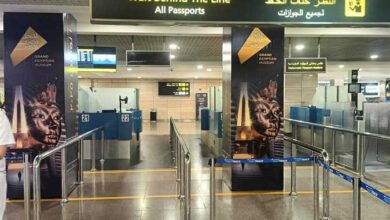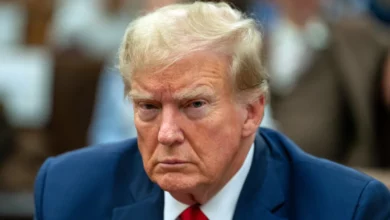Egypt has a new Interior Minister, but policemen, human rights activists and analysts agree that he will be unable to reform the notorious institution he now leads as long as the Supreme Council of the Armed Forces (SCAF) continues to refrain from exhibiting the political will to do so.
When newly appointed Prime Minister Kamal al-Ganzouri selected a former chief of Giza's security directorate, Mohamed Ibrahim, as Interior Minister, some activists rushed to criticize the choice of the man who oversaw the “Sudanese Massacre” — the forceful removal by police of a sit-in by unarmed Sudanese refugees in 2005 that left at least 26 refugees dead.
“He’s one of the students of [former Interior Minister] Habib al-Adly’s school of policing,” said Mohamed Mahfouz, a former police officer and current independent researcher on police reform. Others, including Ibrahim himself, insist that he is one of the few good guys who were in leadership positions during Adly’s tenure.
Ibrahim insisted in a television interview on Wednesday that during his time as Giza's security directorate chief, from 2004 to 2006, there were no consistent violations by the police force. He added that “there is no such thing as Adly’s men.”
Whatever Ibrahim’s record may be, it might not matter when it comes to the prospects of reforming the Interior Ministry under his leadership. Many feel the ball is in the SCAF's court. But the SCAF's relationship with the police and its capability to oversee a full-fledged reform of the security apparatus are currently unknown.
The SCAF and the police
The third week of November saw the bloodiest clashes between protesters and Interior Ministry forces since the 18-day uprising in January. Forty-five people died last month when police used excessive tear gas, rubber-coated bullets, birdshots and, at times, live ammunition to hold back protesters around the country.
“I’m 99 percent sure that the SCAF ordered the use of force and violations against protesters [last month]. The military controls the police now,” said Ahmed Osman, who worked in the General Directorate for Criminal Investigations. Osman resigned from his job during the clashes.
“I came to the realization that there is no hope for change,” said Osman of the reason for his resignation.
SCAF generals, however, have distanced themselves from police actions. “We cannot be attached to the old regime,” SCAF member Mahmoud Hegazy said in a state television interview during the period of violence.
Historically, the police and the military have had a conflicting relationship, but both were used by the former regime as tools to hold on to power. Most of the time, the military enjoyed the upper hand. “The police were used as a scare tactic to keep civilians at bay, while the military was the last line of defense for the regime,” said Mahfouz.
In 1986, the military was deployed in Cairo to quell riots by Central Security Forces objecting to their mistreatment — it was the last time the military was deployed in a city for public security purposes.
Near the end of the Mubarak regime, the role of the Interior Ministry grew. Its structure became more militaristic as the number of conscripts rose, the chain of command became increasingly centralized (around the president) and hierarchies strengthened. “The military was skeptical, [thinking] that Interior Ministry leaders had designs to usurp a higher role in controlling the country. Police saw that the armed forces' reluctance to help Mubarak was to serve their own interests,” said Bahey Eddin Hassan, director of the Cairo Institute for Human Rights Studies (CIHRS), adding that now that the SCAF has replaced the president, their supremacy is beyond question for the time being.
“If you put the absolute best person in the position of Interior Minister right now, civilian or police, he will not be able to do anything to reform the ministry as long the military council continues to refuse any real change in it,” Hassan said. He refused a position as an assistant to the interior minister during former Prime Minister Essam Sharaf’s initial cabinet shake-up in July.
No reform
The protests that launched Egypt’s revolution on 25 January began as demonstrations against police violations. Since Mubarak’s ouster, revolutionaries expected police reformation to become a priority in the new “revolutionary” government. Since then, official reform efforts have been few and far between.
Former Interior Minister Mansour al-Essawy decided to terminate the service of 505 generals and 164 officers on 1 August, a move that was criticized as solely cosmetic.
“Most of these discharges are part of the yearly routine and don’t imply any drastic changes,” said Karim Ennarah, security sector researcher at the Egyptian Initiative for Personal Rights (EIPR).
In March, the government disbanded the State Security Investigation Services (SSIS), a branch of the security apparatus charged with widespread torture and surveillance of civilians. It created the National Security Agency in its place, which is supposed to focus only on terrorism and drug trafficking.
However, a report in Al-Masry Al-Youm in April revealed that the new apparatus has many of the same capabilities and workforce as the SSIS, and could easily revert to being used as the regime’s bludgeon, as it was under Hosni Mubarak.
“The ministry as a whole needs to be restructured. The workforce needs to be retrained. Law enforcement must also be localized so that the ministry does not exercise absolute power,” Mahfouz said. He is a member of the National Initiative to Reform the Police Force, a coalition of human rights and police reform groups.
The initiative has presented the government with recommendations, including bettering the work conditions of low-ranking policemen and allowing them to unionize to increase their sense of accountability.
Police reform has gone nowhere, and reform proposals have seemingly fallen on deaf ears. The security situation remains precarious, and police violations against civilians have continued. While some blame the remnants of Adly’s police, many of whom are still on active duty, many analysts and police officers believe that the SCAF has intentionally refused to enact changes.
“The SCAF does not wish to fulfill the goals of the revolution. They will only tend to the security and Interior Ministry situation when the revolutionary fervor dies down,” said Mahfouz.
A worsening problem
“Not only was there no change, but also there has been a terrible deterioration in the police apparatus since the revolution began,” said Ennarah. “The police exploited the security vacuum after the revolution to pressure people to change their priorities, so that instead of demanding structural reform in the security apparatus, they put the return of the police to the streets as their top priority.”
According to Ennarah, the police deployed in the street today are more heavily armed and willing to use firepower and brute force than before. He has witnessed higher rates of gunfire exchange, especially in crime combat operations. Torture is still prevalent in police stations. And police have been using more violence against protesters: 10 percent of the 3000 injured in the recent Tahrir clashes had eye injuries from rubber shot gun pellets, according to the Foundation for the Support of the Victims of the Revolution.
Besides the November clashes, police violently cracked down on protesters in Tahrir Square on 28 and 29 June. In both cases, civil society organizations documented the use of live ammunition, rubber bullets, birdshots and excessive tear gas by Central Security Forces.
Furthermore, at least nine cases of torture in police stations and prisons have been reported since January, according to Al-Nadeem Center for Rehabilitation of Victims of Violence.
Osman, who used to work at the SSIS, said police no longer do the bare minimum of “policing” they used to do before the revolution, especially as they no longer have a regime to prove loyalty to.
“They don’t care about the public good, only protecting themselves. They don’t want to take responsibility for anything so they make decisions accordingly,” he said.
Since the 1980s, impunity has been a major reason behind the perpetuation of police violations and their indifference towards abuse, Basma Abdel Aziz, a psychologist, writes in her book “Temptations of Absolute Power: A History of Violence in the Police’s Relationship with the Citizen.”
Accordingly, Adly, Mubarak and about 150 policemen are implicated in the killing of more than 800 protesters in the January uprising, but only one police officer has been convicted so far. He received a death sentence in absentia after fleeing the country.
Similarly, post-Mubarak police abuse has gone unpunished.
According to Abdel Aziz, police believe that they are entitled to impunity and take an “us versus them” view of civilians. “The police force is part of the same system that includes institutions that are supposed to monitor it; therefore monitoring bodies cannot side against police with civilians.”
This system hasn’t changed since Mubarak’s ouster. “The SCAF now is just as much part of the system, acting as the president,” said Hassan.
The security apparatus persists in its method of controlling the public and maintaining order through a creating a culture of fear.
In recent decades, police officers hired ex-convicts to stir up violence during elections for the benefit of Mubarak's now-dissolved National Democratic Party’s candidates. Some were forced to do so or risk returning to jail.
According to Colonel Mohamed Abdel Rahman, who works at Daqahlia's security directorate, this network is still intact and working as it used to during the old regime under the supervision of senior police officers.
The fact that these "thugs" were not used to disrupt the elections, but used in many cases against protesters (in both Tahrir and Maspero), means that they are still under police control and are ultimately controlled by the military, who wanted peaceful elections, said Mahfouz.
Usually, the plainclothes men who accompany Central Security Forces in attacking protesters are either police who infiltrate protesters to arrest them or are "thugs" hired by the police, he said.
“These thugs follow orders from the Criminal Investigations Director himself. These decisions are passed from the top ranks in the criminal investigations department and the National Security Authority all the way down to the thugs,” said Abdel Rahman, who is also the head of the Honorable Police Officers, a small group of police seeking the reform of the Interior Ministry. The group formed secretly after the death of Khaled Saeed in April 2010 due to police torture, and began operating openly only after the January uprising.
The interior minister is usually aware of these decisions but not the full details, added Abdel Rahman.
Both Abdel Rahman and Ennarah agree that although the Interior Ministry was hit hard during the revolution, the institution’s hierarchy is still cohesive and capable of protecting itself. Mohamed Ibrahim will have no problems fitting into a system he has spent his entire professional life in, but will be dealing with the new military masters for the first time.



